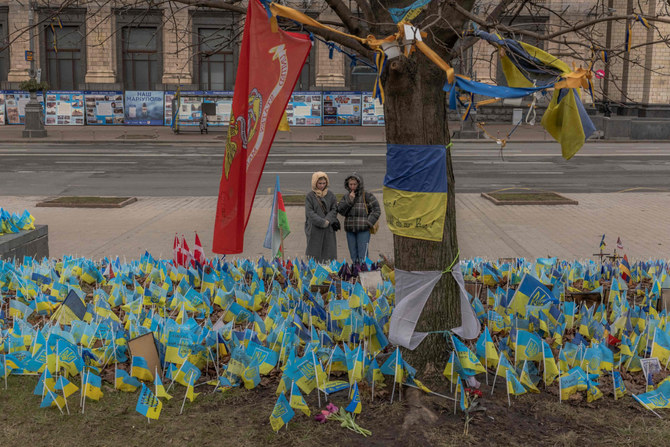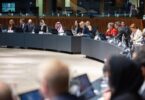Andrew Hammond
Two years on from Russia’s invasion in February 2022, European public opinion has generally remained solidly behind Ukraine. However, a recent key report found only 10 percent of Europeans still believe Kyiv can “win” its battle against Moscow.
The study, by the European Council on Foreign Relations, makes the astute observation that Russian President Vladimir Putin is hoping war fatigue in Europe, and the wider West, will clear the way for his victory in Ukraine. The research draws on the results of a poll carried out in January this year in 12 European countries: Austria, France, Germany, Greece, Hungary, Italy, the Netherlands, Poland, Portugal, Romania, Spain, and Sweden.
The headline finding was that Europeans are not only increasingly pessimistic about Ukraine’s chances of winning the war but most believe it will end in a negotiated settlement, rather than Kyiv fully achieving its aims. Indeed, twice as many Europeans now believe Russia will “win” the conflict, compared with those who think Ukraine will emerge victorious.
The level of confidence in Ukraine’s chances of victory is lowest in nations such as Hungary, which in Prime Minister Victor Orban has Europe’s most pro-Moscow leader, and Greece. More than 30 percent of the population in both these nations believe a Russian victory is more likely. In all of the nations surveyed, only in two, Poland and Portugal, did people believe a Ukrainian victory was more likely than a Russian one.
A plurality of people in Europe, 37 percent on average, think the war will most likely end in a negotiated settlement of some kind. However, there is not (yet) any widespread shift toward outright appeasement of Putin. Indeed, public opinion in three of the countries surveyed — Poland, Portugal, and Sweden — still favors support for Ukraine’s efforts to take back all of its territory.
Against this public opinion backdrop, 2024 will be a very difficult year for Europe if the war continues. With no obvious end to the conflict in clear sight, the resolve of the West is likely to be tested further.
For now, European political leaders still stand shoulder-to-shoulder, more or less, behind Ukraine. For example, new sanctions against Russia were recently agreed by the EU and its other European partners, including the UK.
Certainly, Hungary has been outspoken regarding its concerns about European actions against Russia. But as long as US support for Ukraine remains intact, which is itself a source of growing uncertainty as November’s presidential and congressional elections draw closer, internal European divisions might not come to the boil anytime soon.
This does not mean that behind the public statements of unified European support for Ukraine there are not significant divisions. These schisms were highlighted last year in a previous European Council on Foreign Relations poll, which found that while Europeans felt great solidarity with Ukraine, they were less united in their thoughts about the longer-term goals.
The core differences at that time were between a “Peace” camp, amounting to about one-third of those polled, that wanted the war to end as quickly as possible, and a “Justice” camp, about a quarter of those polled, who believed the more pressing goal was to punish Russia.
In all larger EU member states, apart from Poland, there were more proponents of peace than justice. This might still be true today and the fact that Poland was an outlier might partially explain why Poles have higher-than-average confidence among Europeans that Ukraine will ultimately win against Russia.
The preference for peace last year was strongest in Italy, and is now growing in other nations such as Austria, Greece, Hungary, and Romania. People in these places are worried, increasingly, about the cost of sanctions and/or the threat of military escalation.
Given these public opinion dynamics, the resilience of European democracies will, to a significant degree, depend on the capacity of governments to sustain public support for policies on Ukraine that might cause more economic pain to much of the populace. This at a time when much of the European economy is either on the verge of recession or experiencing low growth.
The challenge is significant here because previous European Council on Foreign Relations surveys revealed a sizable, and potentially expanding, gap between the stated positions of some European governments and the public mood in those countries, including Italy. A great divide is looming between those who want to end the war as quickly as possible, and those who want to carry on fighting until Russia has been defeated, if indeed that is possible.
These European fissures over Ukraine have been camouflaged quite successfully so far. However, this might become tougher this year if the war continues apace and the economic pain caused by the crisis bites even harder.
One way that European leaders can help navigate this potential pitfall, according to the latest European Council on Foreign Relations study, is by making a more persuasive case for maintaining support for Ukraine. This will require some adjustment of political vocabulary, two years into the war, to help define what would constitute a realistic “durable peace.”
To be clear about this, some Europeans view any form of a settlement as peace. Others perceive the only meaningful peace to be one in which Ukraine’s pre-2022, or even pre-2014, borders are reinstated.
The challenge, therefore, lies in building a stronger European, and wider Western, consensus around what being in favor of “peace” actually means, in practice.
As Europe and the US move deeper into what will be a big election year for both, political leaders would benefit from finding a vocabulary that lands better with public opinion in their efforts to maintain popular support for Ukraine.
In this sense, the best way to limit war fatigue would be to build and own the idea of what a successful, sustainable peace deal actually looks like.







